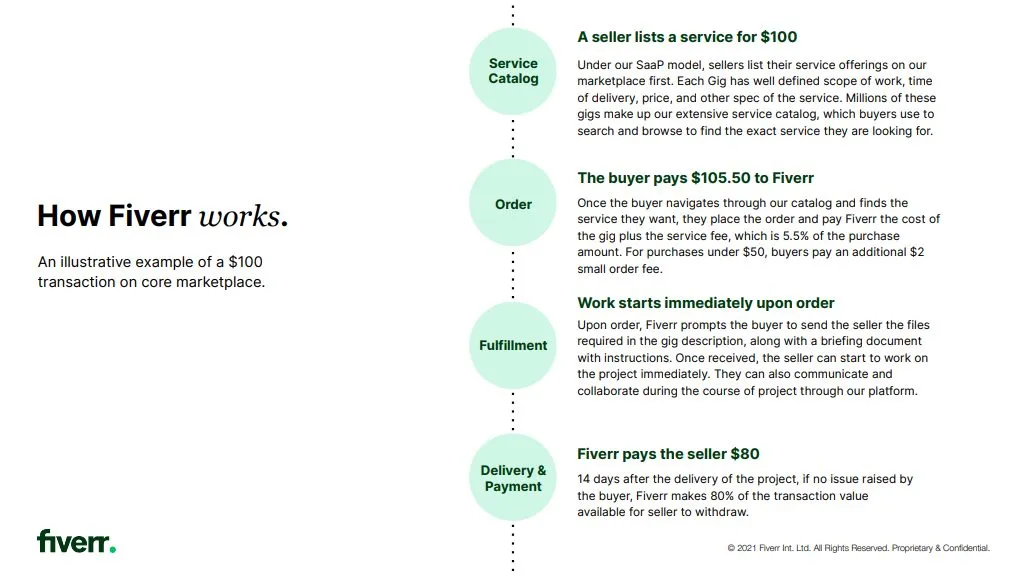Welcome to the world of Fiverr, where creativity meets opportunity! As more people turn to freelancing platforms like Fiverr, understanding the tax implications of your earnings becomes essential. Taxes can be a daunting topic, especially when you are new to the freelance scene. Fear not! This guide aims to simplify everything you need to know about Fiverr taxes so you can focus on what you do best—delivering exceptional services.
Do You Need to Pay Taxes on Fiverr Earnings?

Now, let’s dive into the nitty-gritty: Do you actually need to pay taxes on your Fiverr earnings? The short answer is yes, but let’s explore that a bit more.
When you provide services on Fiverr, you are essentially running a small business. The IRS (or your local tax authority, if you're outside the U.S.) considers freelance earnings as self-employment income. Here are some key points to keep in mind:
- Thresholds: In the U.S., if you make $600 or more in a calendar year from Fiverr, you’re required to report that income and pay taxes on it.
- Self-Employment Tax: Freelancers are responsible for self-employment taxes, which can be about 15.3% of your net earnings. This is a combination of Social Security and Medicare taxes.
- Business Deductions: You can deduct some business-related expenses, like Fiverr fees, software subscriptions, and even a portion of your internet bill, which can significantly lower your taxable income.
- Reporting Income: Fiverr will issue a 1099-K form if you surpass the $600 threshold, but it’s important to keep your own records to ensure everything is accurate.
In summary, yes, you do need to pay taxes on your Fiverr earnings. But with proper planning and a keen eye for deductions, you can keep your tax obligations manageable. So, keep your records organized and consult with a tax professional if you need personalized advice tailored to your unique situation. Happy freelancing!
Also Read This: Do People Still Use Fiverr? A Look into Its Current Popularity and Use Cases
How Fiverr Reports Your Income

When you’re working as a seller on Fiverr, one of the first questions that pop into mind is, "How does Fiverr report my income?" Well, it might surprise you! Fiverr takes the responsibility of reporting your earnings seriously, ensuring compliance with tax regulations.
Here’s how it works:
- 1099 Forms: If you earn over $600 in a calendar year, Fiverr will issue a 1099 form to you and the IRS. This form shows total earnings from your gigs.
- Personal Responsibility: Regardless of Fiverr's reporting, it's still your responsibility to keep track of all your earnings and report them correctly when you file your taxes.
- Transaction Information: Fiverr provides an easy way to track your income via the dashboard, which includes detailed reports of your orders and earnings.
Understanding how Fiverr handles your earnings will save you a lot of headaches during tax season. Keeping your records organized and up-to-date allows you to cross-reference the income reported by Fiverr with your own records. This way, you can ensure that everything aligns and avoid any nasty surprises come tax time!
Also Read This: How to Become a Level 1 Seller Within Just 2 Months
Types of Taxes You May Encounter as a Fiverr Seller

As a Fiverr seller, being aware of the types of taxes you might face is crucial for maintaining a healthy financial profile. Let's break down the primary taxes applicable to you:
| Type of Tax | Description |
|---|---|
| Self-Employment Tax | This tax applies if you earn over $400 from your Fiverr gigs. It covers Social Security and Medicare taxes, which are typically withheld from regular employees' paychecks. |
| Income Tax | As freelance earnings, the money you make through Fiverr is considered taxable income. You'll report this income when filing your federal and possibly state tax returns. |
| Sales Tax | Depending on the nature of your services and where you live, you may also need to charge sales tax on certain transactions. Research whether your services fall under taxable goods or services in your state. |
| Estimated Taxes | Since taxes aren't withheld from your earnings, you might need to pay estimated taxes quarterly to avoid penalties come tax time. |
Being informed about these tax types ensures that you are prepared for tax season and helps you avoid any surprises. Consider consulting with a tax professional who can help you navigate this maze effectively! Remember, knowledge is power when it comes to handling taxes on your Fiverr income.
Also Read This: What Does It Mean When You Put Reservations on Fiverr?
Recording and Documenting Your Fiverr Income

When you're freelancing on Fiverr, keeping track of your income isn't just good practice—it's essential for your financial health and tax obligations. You might be wondering, "How do I even begin?" Well, let’s break it down!
First things first, you want to create a systematic way to record your earnings. Here are some methods to consider:
- Spreadsheets: Use Excel or Google Sheets. Create columns for date, service sold, amount earned, and client details.
- Accounting Software: Tools like QuickBooks or FreshBooks can automate much of this process for you.
- Invoicing: For larger projects, send invoices to clients. This not only documents your income but also provides a professional touch to your business.
Regardless of the method you choose, consistency is key. Regularly update your records to avoid the end-of-year scramble.
Additionally, keep documents like:
- PayPal or bank statements showing payments.
- Email receipts from Fiverr.
- Any contracts or agreements made with clients.
Remember, the IRS requires you to report all income, even if you receive cash or payments through platforms like Fiverr. So, meticulous record-keeping can save you headaches come tax season!
Also Read This: Is Fiverr Credible? Exploring the Trustworthiness of the Freelance Marketplace
Tax Deductions for Fiverr Freelancers
As a Fiverr freelancer, you're in a unique position when it comes to taxes. One of the perks of freelancing is that you can take advantage of various tax deductions. But which ones apply to you? Let's dive in!
First, it’s essential to understand that you can deduct business expenses that are both ordinary (common and accepted in your industry) and necessary (helpful and appropriate for your work). Here’s a list of common deductions:
- Home Office Deduction: If you use a portion of your home exclusively for work, you can deduct associated costs.
- Software and Tools: Any subscriptions or purchases for software you use for freelancing, like graphic design tools or accounting software.
- Internet and Phone Bills: A percentage of these bills can be deducted if they're used for your Fiverr business.
- Marketing Expenses: Costs associated with promoting your services can also be deducted.
- Professional Development: Courses or workshops you take to improve your skills are typically deductible.
It’s beneficial to maintain clear records for these expenses. Consider using a dedicated account or credit card for all business-related purchases. This will not only simplify your bookkeeping but also help substantiate your deductions if you ever get audited.
Consulting with a tax professional can further ensure you’re maximizing your deductions while remaining compliant. After all, every dollar saved is a dollar earned!
Also Read This: What Kind of Company is Fiverr International?
How to File Your Taxes When Earning from Fiverr
Filing your taxes as a Fiverr seller might seem daunting, but once you break it down into manageable steps, it becomes a whole lot easier. Here’s a simple guide on how to tackle your tax obligations:
- Determine Your Earnings: Start by gathering all your income information from Fiverr. You can access your earnings summary from your Fiverr account dashboard.
- Keep Track of Expenses: As a freelancer, you're allowed to deduct expenses related to your work. This might include software subscriptions, marketing costs, and any other expenses directly related to your Fiverr gigs. Make sure to keep receipts!
- Choose Your Filing Method: Decide whether you're filing your taxes yourself or seeking help from a tax professional. If you're comfortable with numbers, software like TurboTax or H&R Block can simplify the process.
- Fill Out the Right Forms: As a self-employed individual, you’ll likely need to fill out Form 1040 and Schedule C. This section allows you to report your income and claim your deductions.
- Keep Records: Maintain a file of all documents, including invoices, receipts, and tax forms for at least three years. This is crucial if you’re ever audited.
- Pay Estimated Taxes: Depending on your total income, you may need to make estimated tax payments throughout the year to avoid penalties.
Remember, the sooner you start the process, the less stressful it will be. And don’t hesitate to reach out for professional help if you find yourself feeling overwhelmed.
Also Read This: How to Write an Irresistible Offer on Fiverr
Important Deadlines and Schedule for Tax Filing
Staying ahead of your tax obligations is crucial, especially when you're earning income through Fiverr. Let's break down the key deadlines and the filing schedule you need to remember:
| Deadline | What to Do |
|---|---|
| January 31: | Receive forms like the 1099-K from Fiverr if you've earned over $600 during the previous year. |
| April 15: | File your personal income tax return. This is the deadline to submit your Form 1040 and Schedule C. |
| Quarterly Estimated Tax Payments: | If you expect to owe $1,000 or more, make estimated tax payments. The due dates are generally April 15, June 15, September 15, and January 15 of the following year. |
Marking these dates in your calendar can help avoid last-minute scrambles. Also, be aware of any changes to your local or federal tax laws as they can affect these deadlines. It’s better to be informed and prepared so that you can focus on what you do best—providing amazing services on Fiverr!
Understanding Fiverr Taxes: What You Need to Know
As a freelancer on Fiverr, it’s crucial to understand your tax obligations. Here’s a comprehensive guide to help you navigate the complexities of Fiverr taxes.
When you earn money on Fiverr, you are classified as a self-employed individual, which means you are responsible for managing your own taxes. Here are key points to consider:
Income Reporting
Any money you earn on Fiverr, even if it is below the tax threshold, should be reported when filing your taxes. The IRS requires you to report all income, regardless of the source.
Tax Forms
You'll primarily deal with two tax forms:
- Form 1099-K: Issued if you earn over $600 in a calendar year.
- Schedule C: Used to report income from self-employment.
Self-Employment Tax
As a self-employed worker, you will owe a self-employment tax, which consists of:
- Social Security Tax (12.4%)
- Medicare Tax (2.9%)
This totals a self-employment tax rate of 15.3% on your net earnings.
Deductions
As a Fiverr freelancer, you can deduct eligible business expenses, such as:
| Expense Type | Description |
|---|---|
| Software & Tools | Expenses for programs necessary for your work. |
| Internet Costs | A proportion of your home internet bill. |
| Advertising | Costs of promoting your Fiverr gigs. |
Understanding Fiverr taxes is essential for financial management. To ensure you're meeting your tax obligations, consider consulting with a tax professional or using accounting software tailored for freelancers.
Conclusion
Staying compliant with Fiverr taxes involves thorough record-keeping, understanding your tax responsibilities, and ensuring you take advantage of all available deductions. By remaining informed, you can effectively manage your freelance income and avoid any tax-related surprises.



